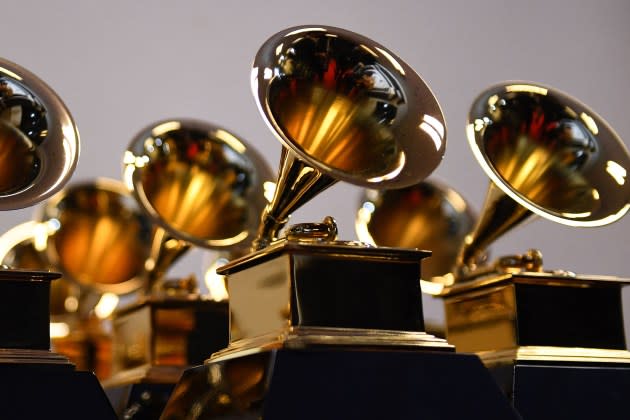Grammys Intelligently Ban Artificial Intelligence From Awards Eligibility
- Oops!Something went wrong.Please try again later.

Fake Drake and the Faknd won’t be winning real Grammys anytime soon, now that the CEO of the Recording Academy has disallowed “Heart on My Sleeve” — a song that uses AI to mimic the voices of the Weeknd and Drake — from awards eligibility.
A TikTok user called Ghostwriter977 composed the song and used software to approximate the singers’ voices; Apple, Spotify, and TikTok have removed the track. Nevertheless, Ghostwriter977 submitted the track for Grammys consideration in the categories of Best Rap Song and Song of the Year. Mason told The New York Times earlier this week that the song is “absolutely eligible because it was written by a human.” Now he’s changed his mind.
More from Rolling Stone
AI Technology Guzzles Water: Enough to Fill 2,500 Olympic-Sized Pools
How A.I. Could Reincarnate Your Dead Grandparents - or Wipe Out Your Kids
“Even though it was written by a human creator, the vocals were not legally obtained, the vocals were not cleared by the label or the artists, and the song is not commercially available,” he said in an Instagram post, “and because of that, it’s not eligible.”
Mason said that he takes the discourse surrounding artificial intelligence and the implications it has on creativity seriously. “I’m sure things are going to continue to have to evolve and change,” he said. “But please, please, do not be confused. The Academy is here to support and advocate and protect and represent human artists, and human creators, period.”
The song’s virality alarmed the record industry earlier this year. “Human artistry is irreplicable,” RIAA chairman and CEO Mitch Glazier said in April. “Recent developments in AI are remarkable, but we have seen the costs before of rushing heedlessly forward without real thought or respect for law and rights. Our principles are designed to chart a healthy path for AI innovation that enhances and rewards human artistry, creativity, and performance.”
“We have a moral and commercial responsibility to our artists to work to prevent the unauthorized use of their music and to stop platforms from ingesting content that violates the rights of artists and other creators,” a spokesperson for UMG told the Financial Times. “We expect our platform partners will want to prevent their services from being used in ways that harm artists.”
“The future of music is here. Artists now have the ability to let their voice work for them without lifting a finger,” Ghostwriter wrote. “If you’re down to put it out, I will clearly label it as AI, and I’ll direct royalties to you. Respect either way.”
Ghostwriter977 has commented that they see their art as something of a protest against labels, though. “I was a ghostwriter for years and got paid close to nothing just for major labels to profit,” the person wrote in comments for their videos. “The future is here.” And when the creator recently teased a new song featuring a fake Travis Scott and fake 21 Savage, they asked the real artists to collaborate. “The future of music is here,” they wrote. “Artists now have the ability to let their voice work for them without lifting a finger. If you’re down to put it out, I will clearly label it as AI, and I’ll direct royalties to you. Respect either way.”
Best of Rolling Stone
